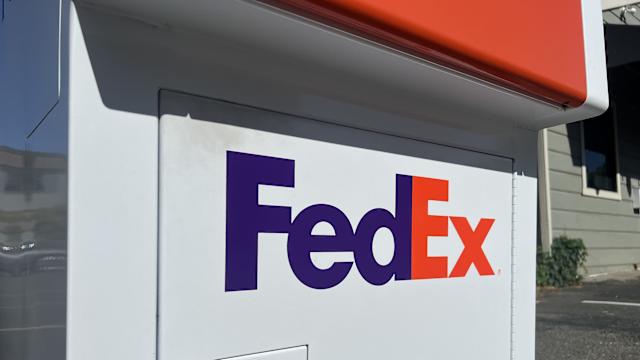
LOS ANGELES (Reuters) - FedEx Corp. (FDX) signaled caution for the year ahead and forecast current-quarter profit short of market expectations amid volatile global demand, sending shares of the delivery giant down more than 5% after hours.
FedEx and rival United Parcel Service Inc. (UPS) are considered economic bellwethers because they work with virtually every type of company around the world and spot business trends early. U.S. President Donald Trump's whiplash tariffs on China and pending deals with many other trading partners have forced many executives to put business plans and forecasts on hold until they have more certainty on product costs.
"The global demand environment remains volatile," FedEx CEO Raj Subramaniam said on an earnings webcast. FedEx declined to issue full-year earnings and revenue forecasts, citing uncertainty over U.S. trade policies, particularly with regard to China - the world's largest exporter.
FedEx is more exposed to China trade than rival UPS, whose shares were down less than 1%. Washington slapped 145% tariffs on China in April, freezing trade between the superpowers, before lowering them to 30% in May. Company executives said they expect Trump's tariff policies to continue pressuring the China-to-U.S. trade air transit.
The biggest hit is from the Trump administration ending duty-free status for direct-to-consumer shipments from China-linked bargain sellers like Temu and Shein, FedEx Chief Customer Officer Brie Carere said. As a result, the Memphis-based company forecast fiscal first-quarter adjusted profit of $3.40 to $4 per share. That was below analysts' estimates of $4.06 per share, according to data compiled by LSEG.
The outlook overshadowed better-than-expected results for the fiscal fourth quarter that ended May 31, when the firm said cost cuts and improved export volumes pushed operating margins higher. Adjusted profit in the May-ending quarter was $1.46 billion, or $6.07 per share, up from adjusted profit of $1.34 billion, or $5.41 per share, a year earlier. Revenue rose to $22.2 billion from $22.1 billion. Analysts, on average, expected earnings of $5.81 per share on revenue of $21.8 billion, according to LSEG.
FedEx and UPS have been locked in a long battle for market share, with demand from manufacturers and other industrial customers stalled. Delivery profits have been squeezed as many customers downshifted from fast, pricey air services to slower, lower-cost ground shipments moved by trucks and trains. Both FedEx and UPS used air volume from Temu, Shein and other retailers that shipped direct from factories in China to help replace lost business-to-business volume, but that ceased this spring.
After a botched attempt early this year, Trump's administration in May ended duty-free treatment for direct-to-consumer shipments valued at less than $800 from China - stopping millions of air parcels from flooding into the United States. FedEx said separately it planned to spin off its trucking business in June 2026.
Reporting by Lisa Baertlein in Los Angeles and Abhinav Parmar in Bengaluru; Editing by Marguerita Choy, David Gregorio and Jamie Freed.
The drop in FedEx's share price highlights the lingering effects of escalated tariffs on profit margins, underscoring how uncertainty surrounding trade policies can impact global logistics companies like no other.
This 5% decline in FedEx shares reflects the market's jitters over potential profit erosion due to escalating tariffs, illustrative of complex challenges faced by global logistic companies as they navigate trade barriers.
This loss in FedEx shares can be attributed to the severity of tariff-related challenges, indicating investors' concerns about future profitability amidst trade disputes.
The recent drop in FedEx's share price highlights the vulnerability of global trade logistics firms to risky tariff variations, especially as it forebodes potential impacts on clients and long-term profitability.
The sudden downturn of FedEx's share price by 5% owing to the profit outlook being tainted with tariff challenges highlights how sensitive global trade concerns still remain in today’t economy.
This article highlights an insightful view into how the current tariff challenges are having a direct impact on FedEx's profit outlook, resulting in their share prices dipping 5%, illustrating clearly that even logistics giants like FedEX face economic pressures amidst escalated trade tensions.
This 5% decrease in FedEx's share price underscores the market sensitivity to its revised profit projections, highlighting investors’ concerns about ongoing tariff-related challenges.
FedEx’s recent stock market plunge highlights how sensitive the logistics industry remains to expenses associated with global tariffs, underscoring its vulnerability in an uncertain economic climate.










![Isothermal Bags Containers Market [2028]: Top Trends, Size, and Competitive Intelligence - TechSci Research](https://antiochtenn.com/zb_users/upload/2025/07/20250719012446175285948669203.jpg)



